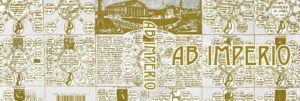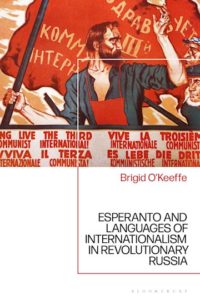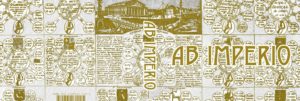Best Historical Research of 2021: Ab Imperio and KRES Poliskola finalize the competition and award the winners

The editors of Ab Imperio and KRES Poliskola – КРЕС Полишкола are happy to announce the winners of Ab Imperio 2021 annual award!
They represent the cutting-edge scholarship that is incompatible with aggression, nationalism, and imperialism not only politically but also and most importantly, methodologically and epistemologically. Hurrah!
Because of the war, the traditional Ab Imperio Award public lectures will be delivered at the University of Illinois at Chicago during the fall of 2022.
1) Best book:
 Brigid O’Keeffe, Esperanto and Languages of Internationalism in Revolutionary Russia (New York; London: Bloomsbury, 2021). 266 pp., ill. Bibliography. Index. ISBN: 978-1-350-16065-1.
Brigid O’Keeffe, Esperanto and Languages of Internationalism in Revolutionary Russia (New York; London: Bloomsbury, 2021). 266 pp., ill. Bibliography. Index. ISBN: 978-1-350-16065-1.
Esperanto and Languages of Internationalism in Revolutionary Russia traces the history and legacy of this effort: from Esperanto’s roots in the social turmoil of the pre-revolutionary Pale of Settlement; to its links to socialist internationalism and Comintern bids for world revolution; and, finally, to the demise of the Soviet Esperanto movement in the increasingly xenophobic Stalinist 1930s. In doing so, this book reveals how Esperanto – and global language politics more broadly – shaped revolutionary and early Soviet Russia.
Special mention:
Timothy K. Blauvelt, Clientelism and Nationality in an Early Soviet Fiefdom: The Trials of Nestor Lakoba (Milton Park, UK: Routledge, 2021). 248 pp., ill. Index ISBN: 978-1-032-01000-7.
Based on extensive original research, this book tells the astonishing story of early Soviet Abkhazia and of its leader, the charismatic Bolshevik revolutionary Nestor Lakoba.
2) Best article in a peer-reviewed academic journal or chapter in a scholarly collection:
 Igor Kuziner, “Millenarists, Capitalists, Cooperators: The Late Imperial and Early Soviet Experience of the Old Believers–Wanderers,” Ab Imperio 22, no. 2 (2021): 25–59.
Igor Kuziner, “Millenarists, Capitalists, Cooperators: The Late Imperial and Early Soviet Experience of the Old Believers–Wanderers,” Ab Imperio 22, no. 2 (2021): 25–59.
Igor Kuziner takes a fresh look at the history of the Old Rite (or Old Believers – Eastern Orthodox Christians) movement: he came to this topic from the Soviet period, where it was supposed to show how schismatics, together with the Bolsheviks, united on the basis of fanaticism. The author shows that there was no fanaticism: religion is one thing, and social behavior is completely different.
Special mention:
Aleksandr Korobeinikov and Egor Antonov, “Toward a Postimperial Order? The Sakha Intellectuals and the Revolutionary Transformations in Late Imperial Russia, 1905–1917,” Sibirica: Interdisciplinary Journal of Siberian Studies 20, no. 2 (2021): 27–59.
3) Best dissertation chapter:
Irina Nicorici, “Becoming a Soviet Citizen: Migration, Citizenship, and the Politics of Belonging in the USSR, 1960–1990” (Rutgers University, 2021).
The author considers the issue of acceptance into Soviet citizenship on the example of the developing economy of Moldova: what was the attempt to introduce the norms of common law in the absence of private property in the USSR?
Special mention:
Pietro Shakarian, “An Armenian Reformer in Khrushchev’s Kremlin: Anastas Mikoyan and the Politics of Difference in the USSR, 1953–1964” (Ohio State University, 2021).
This round of competition is over! The call for nominations for the 2022 publication awards will be announced in the fall.
For the announcements of the 2022 competition, please follow the website of the AB Imperio magazine and subscribe to the news of our KRES Poliskola.
Good luck!



